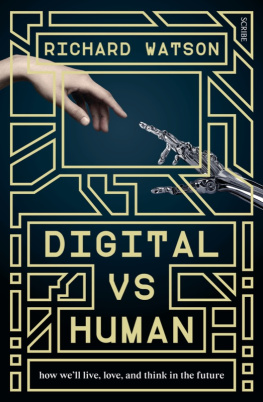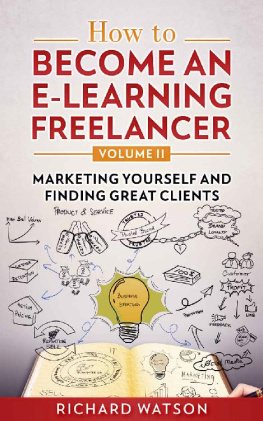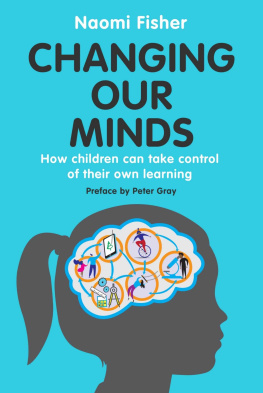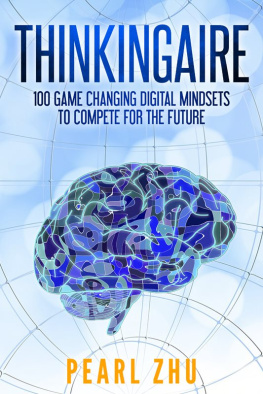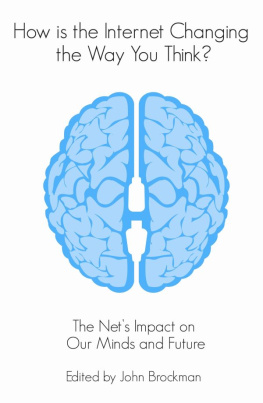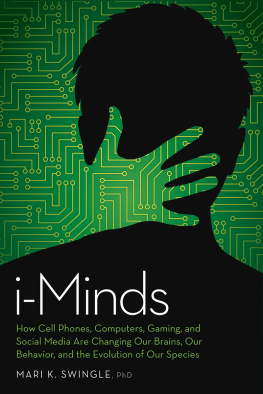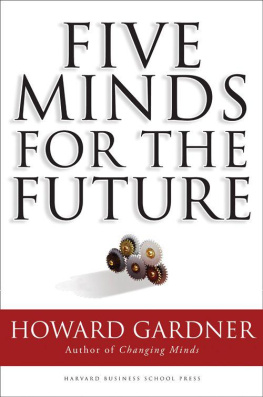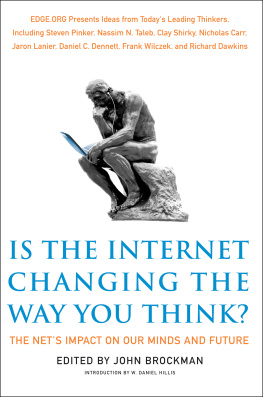Richard Watson is an author, speaker, and consultant who helps individuals and organizations to think ahead, with a particular emphasis on strategic foresight. He is the founder of Whats Next, a website that documents global trends, and is co-founder of Strategy Insight, a scenario planning consultancy.
His clients have included, among others, IBM, McDonalds, PricewaterhouseCoopers, Virgin, Department of Education, Public Libraries NSW, Ikea, Toyota, Coca-Cola, and PepsiCo.
Richard also writes for a number of business publications worldwide, including Fast Company (US), Future Orientation (Denmark), and Retail Banking Review (Australia).
Richard was born in the UK and divides his time, rather unsuccessfully, between London and Sydney. Apart from two future minds (aged 8 and 10), his other interests include old cars, old wine, and fixing things in sheds.
Further information can be found at:
www.nowandnext.com
www.strategyi.net
www.futuretrendsbook.com
For Georgie, who gives me the space to dream.
Praise for Richard Watsons previous book
FUTURE FILES
Pick of the Week: Cheaper than a crystal ball and twice as fun, this book by futurist and web creator Watson examines what someday could be like, based on the five key trends of ageing; power shift to the East; global connectivity; the GRIN technologies of Genetics, Robotics, Internet, and Nanotechnology; environmental concerns, and 50 less general but equally influential developments that will radically alter human life by the year 2050.
Watson gently scoffs at Jetsons-like wishful-thinking technology and flying cars; instead he predicts the fanciful (mindwipes, stress-control clothing, napcaps that induce sleep) and the useful (devices to harness the sea to generate energy; self-repairing car paint; retail technology that helps us shop, based on past buying habits; hospital plasters that monitor vital signs).
In between the fun and frivolity, he prognosticates the frightening: the extinction of individual ugliness and free public spaces; the creation of hybrid humans; a society made of people who are incapable of the tiniest tasks; and insects that carry wireless cameras to monitor our lives. Part Jules Verne, part Malcolm Gladwell, Watson has a puckish sense of humor and his book is a thought-provoking, laughter-inducing delight.
Publishers Weekly
A Must Read. Well written and concise predictions.
MediaFuturist.com
A detailed investigation into what author Richard Watson believes are the five key trends that will shape our future. Things get interesting once Watson unravels the effects of the combined trends. There is an amusing extinction timeline for the next 50 years, where he nails his colours to the mast in predicting the ideas destined for the scrap-heap.
Director
I found myself warming to his intense curiosity about what is going on in the world and I appreciated the absence of academic snobbery.
Simon Caterson in The Age
Watsons book is as much about analysing the speed and robustness of trends that are already emerging to distinguish between short-term fads and long-term shifts. The book is at its most interesting when Watson makes specific predictions for how everyday objects will change.
Irish Times
Inspirational read. Take a peek 50 years into the future with this fascinating map of the trends that will change our lives for the better, as well as those things well leave behind. Mind-blowing predictions are interlaced with fictional letters from the future at the end of each chapter to better illustrate the effect of these scientific advances on peoples lives.
Soul & Spirit
Author Richard Watson examines emerging patterns and developments in society, politics, science and technology, media and entertainment, and other industries and makes educated, and witty speculations as to where they might take us.
Fast Company
Provocative, entertaining, and full of surprising facts. A book to help you decide whether the world is going mad or possibly becoming more intelligent.
Theodore Zeldin, author of An Intimate History of Humanity
Futurologist Richard Watson journeys into tomorrows world.
Daily Telegraph
Richard writes in a very clear fashion and presents a myriad of ideas and possibilities in a very readable and accessible way. It is a great read for anyone wanting to think about what the future might hold.
Emergent Futures
A snappy look at possibilities and a timely dose of reality.
Boss Magazine/Australian Financial Review
He deserves a gold star for predicting a credit meltdown.
Guardian
FUTURE MINDS
How the digital age is changing
our minds, why this matters,
and what we can do about it
Richard Watson

First published by
Nicholas Brealey Publishing in 2010
35 Spafield Street
Clerkenwell, London
EC1R 4QB, UK
Tel: +44 (0)20 7239 0360
Fax: +44 (0)20 7239 0370 | 20 Park Plaza, Suite 1115A
Boston
MA 02116, USA
Tel: (888) BREALEY
Fax: (617) 523 3708 |
www.nicholasbrealey.com
www.nowandnext.com | www.futuretrendsbook.com |
Richard Watson 2010
The right of Richard Watson to be identified as the author of this work has been asserted in
accordance with the Copyright, Designs and Patents
Act 1988.
ISBN: 978-1-85788-549-1
Library of Congress Cataloging-in-Publication Data
Watson, Richard, 1961
Future minds : how the digital age is changing our minds, why this
matters, and what we can do about it / Richard Watson.
p. cm.
Includes bibliographical references and index.
ISBN 978-1-85788-549-1 (alk. paper)
1. Cognitive science. 2. Thought and thinking. 3. Information technology--Psychological aspects. 4. Digital communications--Psychological aspects. 5. Information technology--Social aspects. 6. Digital communications--Social aspects. I. Title.
BF311.W294 2010
303.4833--dc22
2010033536
British Library Cataloguing in Publication Data
A catalogue record for this book is available from the
British Library.
All rights reserved. No part of this publication may be reproduced, stored in a retrieval system, or transmitted, in any form or by any means, electronic, mechanical, photocopying, recording and/or otherwise without the prior written permission of the publishers. This book may not be lent, resold, hired out or otherwise disposed of by way of trade in any form, binding or cover other than that in which it is published, without the prior consent of the publishers.

Printed in the UK by Clays St Ives plc.
Contents
To go faster you need to go slower.
Sir Jackie Stewart
The degree of slowness is directly proportional to the
intensity of memory; the degree of speed is directly
proportional to the intensity of forgetting.
Milan Kundera
If we want things to stay as they are,
things will have to change.
Next page


